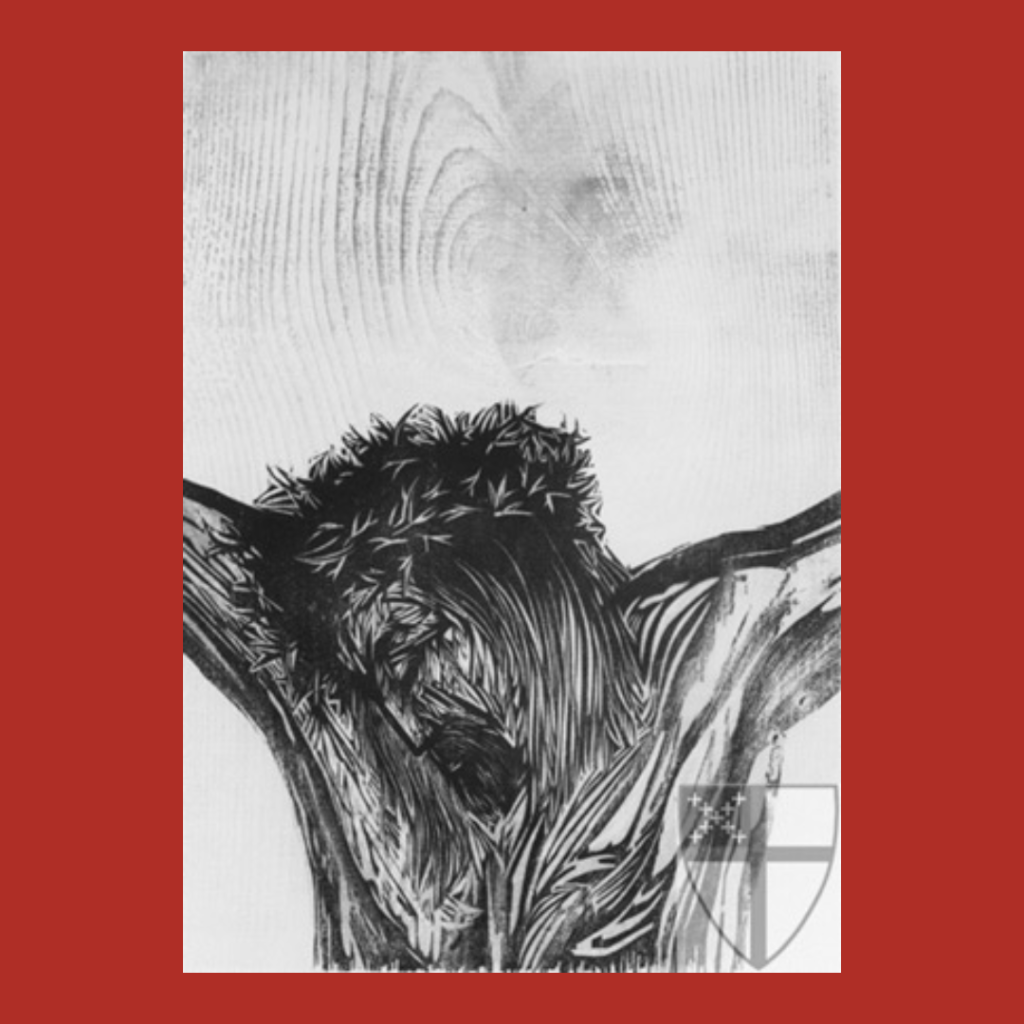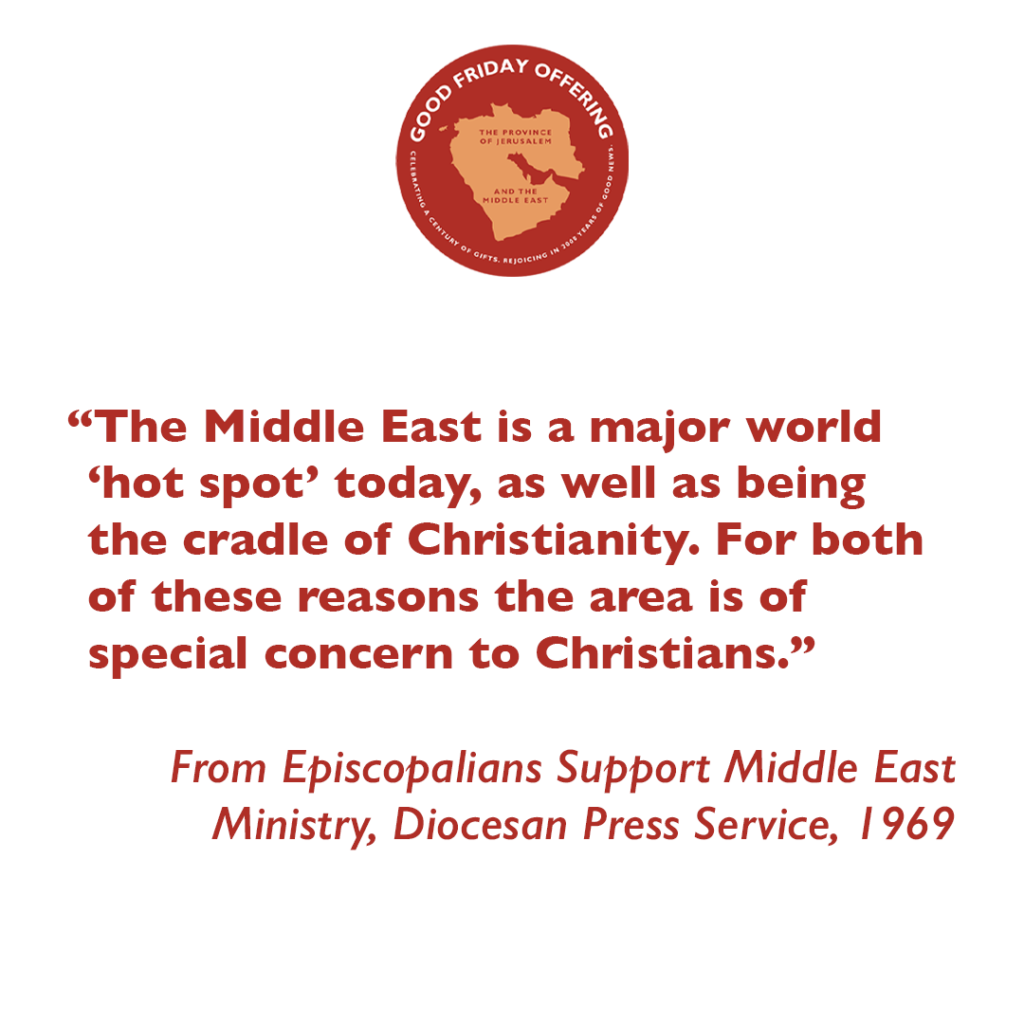The Good Friday Offering: 1962-1972
The fifth decade of the Good Friday Offering saw a transformation of culture with words like “groovy” and “hippie” working their way into the lexicon of the day. Impacted by the Civil Rights movement, anti-war protest, feminism, and the emergence of gay rights, Americans continued their experiences of radical changes over the decade.

If you were alive in 1963, chances are you remember where you were when you heard that President John F. Kennedy was assassinated. This event shattered America’s sense of security and, as we will see in this blog, initiated one of the most turbulent eras in the country’s history. In 1964, Beatlemania was a word we began to understand as we met John, Paul, George, and Ringo, and English rock-and-roll forever changed American music and culture. 1964 also saw Congress authorize the president to take “all necessary measures” to protect American soldiers and their allies from the communist Viet Cong. Within days of this pronouncement, the draft began. The Vietnam War escalated and in 1966, U.S. forces bombed the North Vietnamese capital of Hanoi.
Regretfully, battles were not limited to only one region, as in 1967, Israel and its Arab neighbors once again found themselves embroiled in war. The Jewish state prevailed in what came to be known as the Six-Day War, though the peace would be fragile and lead to retrenchment on every side.
A year after President Lyndon B. Johnson signed the Civil Rights Act of 1964, Bloody Sunday occurred. Civil rights activists marching towards Montgomery, Ala., in pursuit of voting rights were confronted and brutalized on the Edmund Pettus Bridge by armored police, dogs, tear gas, and bullwhips. Much of this was broadcast live. and both politicians and citizens taking a stand against the violence saw the President sign the 1965 Voting Rights Act.
One commentator remarked that 1968 “seemed to deliver a new Earth-shattering headline every week.” In April, a gunman murdered Dr. Martin Luther King, and almost exactly two months later, the headlines would tell of the murder of Robert Kennedy. Chicago was the scene of the 1968 Democratic National where police used tear gas and billy clubs to break up protests. And who could ever forget the summer of 1969, when more than 400,000 young people trooped to the Woodstock music festival in upstate New York? Yet the “peace and love” meant to be generated by the music festival was scattered in 1970 when soldiers of the Ohio National Guard opened fire with live ammunition into a crowd of protestors at Kent State University, killing four students and wounding nine others. The 1972 Olympic Games were also stained with violence, with the murder of 11 Israeli athletes and a West German police officer by Palestinian terrorists at the Munich Olympics. Terrorism had become a global phenomenon.
As we have seen repeatedly, the work of the Good Friday Offering continued through turbulence and upheaval, devoted to its mission of serving the causes of peace and human flourishing in the Holy Land. The Episcopal Church Archives record in 1963 that, “The annual Good Friday Offering of the Episcopal Church is part of a worldwide offering designated for Jerusalem and the East. It supports the work of the Anglican archbishopric centered at the Collegiate Church of St. George the Martyr in Jerusalem; and also the work in Iraq, Iran, the Persian Gulf, Egypt, Sudan, Libya, Israel, and Cyprus. Grants are also made for the work of the Rt. Rev. Najib A. Cuba’in, Bishop of Jordan, Lebanon and Syria, the work of the World Council of Churches in the Near East, and Church World Service for assistance to refugees.”
Throughout the 1960s, throughout continued upheaval both at home and abroad – and especially in the Middle East – the Good Friday Offering for work in the Holy Lands continued to grow and was disbursed to the Joint Commission on Ecumenical Relations, to the Archbishop in Jerusalem, the Bishop in Iran, the Bishop in Jordan, the Diocese of the Sudan and to several ecumenical projects in the Near East.
This Diocesan Press Service release from February 25, 1969, gives a wonderful sense of the ministry of the Good Friday Offering – both then and now:

Episcopalians Support Middle East Ministry
Diocesan Press Service. February 25, 1969 [74-13]NEW YORK, N.Y. — The Middle East is a major world “hot spot” today, as well as being the cradle of Christianity. For both of these reasons the area is of special concern to Christians.
Each year, on Good Friday, Episcopalians are asked to make a special offering for the work of the Church in the Middle East. Through this offering they support the work of the Jerusalem Archbishopric, a jurisdiction which includes both Israel and her Arab neighbors, extending from the Persian Gulf to the Turkish border.
Its five Dioceses are Jerusalem; Egypt and Libya; Iran; Jordan, Lebanon and Syria; and The Sudan.
Last year Episcopalians contributed $67,917.13 to the Good Friday Offering.
In compliance with a resolution passed in 1967 by the General Convention, $15,000 of this amount was sent to the Jerusalem and the East Mission. This British missionary society works specifically in the Archbishopric, and the money contributed to it, along with $2, 900 specifically for the Archbishopric, goes to support the overall work in the Middle East.
The Diocese of Iran received $10,000 from the Offering, $5,000 to support the Diocesan school program and $5,000 to support missionary and service efforts of the Diocese.
The Diocese of the Sudan received $10,000. Due to the unstable situation in the Sudan, many priests in the southern part of the country have had to flee their homes and are now refugees. The money contributed from the Good Friday Offering will be used to aid these homeless clergymen.
A grant of $5,000 to the Diocese of Jordan helps that Diocese in coping with a bank account freeze instituted after the six-day war in 1967 and still in effect, making it difficult to pay clergy salaries, to obtain school fees, etc.
The Rev. Canon John Zimmerman, who represents the Episcopal Church on the staff of the Archbishop in Jerusalem, is also supported from the Offering. During 1968 the amount allocated for this purpose was $9,960.27.
St. George’s College, a central Anglican college being established in Jerusalem, received $2,912 for a lecture room.
Ecumenically, the Offering enables the Episcopal Church to assist in the work of the Orthodox and Eastern Churches in the Middle East. Social and educational projects of these Churches were aided with a grant of $5,000. This money went, in part, to a Greek Orthodox and to an Armenian Orthodox seminary in Lebanon.
The construction of a new Coptic Cathedral in Cairo was helped with a contribution of $500 and work among students of all Christian Churches aided with a grant of $1,500 toward the support of Gabriel Habib, a Greek Orthodox layman who serves as representative in the Near East of the World Student Christian Federation and of the Youth Department of the World Council of Churches.
Please join us in celebrating a century of gifts and rejoicing in 2,000 years of Good News. Give now at iam.ec/goodfridayoffering or text ‘GFO’ to 91999 (messaging and data rates apply).


